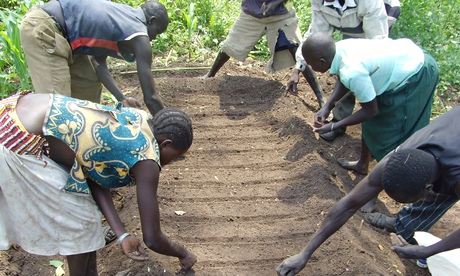The Jay Family have a fertile message for their compatriots to stave off hunger and resolve conflict
-
By Adam Bemma in Juba for IPS, part of the Guardian development network–

“What is the benefit when children are crying and people are dying due to hunger? There is no need to cry when you have the potential to dig,” sing the Juba-based dance hall reggae group, the Jay Family, on their latest single Stakal Shedit, which means work hard in Arabic.
In the Stakal Shedit video, the three members, Jay Boi, Jonio Jay and Yuppie Jay, wear denim overalls and rubber boots with garden hoes slung over their shoulders. The objective is to motivate youth to engage in agriculture as a means of fighting food insecurity in South Sudan against a background of civil war.
“Agriculture is the backbone of this country,” Jay Boi, 23, said. “The land in South Sudan is fertile. If you look around all you see are trucks bringing in food from outside of the country.”
The UN Food and Agriculture Organisation states that 3.5 million, or almost one in three South Sudanese, are facing a severe food crisis.
The Jay Family, whose members come from Yei, 100km (62 miles) south-west of the capital, Juba, formed in 2010 with the object of spreading South Sudanese music to all parts of east Africa and beyond.
“Our music is influenced by hip-hop, reggae and afro-dance music,” the 23-year-old Yuppie Jay said. “I’m also a farmer. I learned from my uncle who grows many different crops.”
The Stakal Shedit music video was shot at Rajaf farm outside the capital and it shows inmates from the Juba Central Prison engaged in agricultural activities.
“We learned from the prisoners how to distribute seeds. In the video we were cultivating maize, okra, tomatoes, carrot and cassava,” the Jay Family’s manager, Stephen Lubang, said.
A scene depicts a group of young men sitting at a table playing a game of cards while drinking alcohol. It cuts to the Jay Family singing in the prison farm. The song continues: “Don’t blame the government when you can do something. Cultivate!”
The group calls on South Sudanese youth to consider agriculture and agri-business, instead of violence, as a way to combat unemployment and generate income. In the song the group addresses how poor infrastructure, like roads, can frustrate people starting small business.
“The major activity for youth in this country is to sit and cry that there are no jobs. If you want the government to help you, start farming,” Lubang said. “Then you can go to the government and ask for assistance.”
Last May, a group of 12 South Sudanese artists united in calls for peace when news of the British explorer and journalist Levison Wood’s 6,000km trek along the Nile river reached Juba. Let’s Stand Together was recorded by South Sudan All Stars. The song urges political leaders to reconcile at the Addis Ababa, Ethiopia, peace talks.
Silver X is a 26-year-old South Sudanese musician who wrote Let’s Stand Together. He was displaced from his home in Torrit with his family in 2000. Four years ago he returned to his birthplace from a refugee camp in Uganda to launch his music career and help jump-start South Sudan’s burgeoning music industry.
“When the recent fighting started it affected us all in different ways. I decided to write a song with artists from different tribes,” he said. “If leaders could see the youth of this country crying for peace, I thought things might start to change.”
Moro Lokombu is a radio journalist and host of The Beat, a music programme highlighting South Sudanese music, at Juba’s UN-run Radio Miraya.
“We need to promote peace through local music by first exposing South Sudanese to it,” Lokombu said. “I play Stakal Shedit and Let’s Stand Together on my radio show because they are songs with a powerful message.”
On 16 June, the Jay Family, along with Silver X, launched a national campaign called Music Against Hunger at the Juba Regency hotel. Dates are now set in September for performances in the southern cities of Nimule and Yei, with more to come.
“We are starting with free concerts in two states, but we hope to travel to all 10 states to perform,” Lubang said. “Let’s work hard to stop war and develop our country. The future of South Sudan relies on its youth. Hunger is something we can fight.”


You must log in to post a comment.